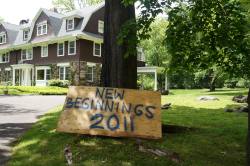One Thousand and One Michaelian Fights
- Details
- Hits: 4985
 It appears the Chairman of our Westchester County Board of Legislators, Ken Jenkins (D Yonkers) has begun his 2013 race for County Executive. He’s beefed up his campaign staff, courtesy of the taxpayers of course, with no opponent in sight this November. Many of the press releases coming from his office can only be described as political in nature. For example, in May out of about two dozen releases, at least eight were written about what a terrible person County Executive Rob Astorino is. Jenkins tends to end the press release expressing hope that all involved can get past the attacks and the distractions and get back to governing. The irony of Jenkins himself being the one creating the distractions, and issuing the attacks and, most important, doing anything in his power to prevent Astorino from governing, is lost on Jenkins.
It appears the Chairman of our Westchester County Board of Legislators, Ken Jenkins (D Yonkers) has begun his 2013 race for County Executive. He’s beefed up his campaign staff, courtesy of the taxpayers of course, with no opponent in sight this November. Many of the press releases coming from his office can only be described as political in nature. For example, in May out of about two dozen releases, at least eight were written about what a terrible person County Executive Rob Astorino is. Jenkins tends to end the press release expressing hope that all involved can get past the attacks and the distractions and get back to governing. The irony of Jenkins himself being the one creating the distractions, and issuing the attacks and, most important, doing anything in his power to prevent Astorino from governing, is lost on Jenkins.
With Jenkins preoccupied with doing his thing the board -- lacking leadership-- has done one dumb thing after another -- and then they issue press releases praising themselves -- for doing dumb things. By dumb I mean does it make sense to vote against an extension of the county sales tax only weeks after you voted to request an extension of the county sales tax in Albany? Especially since the revenue from the sales tax you just voted against is necessary for that historic tax cut about which you keep bragging? Things like that. But mostly it’s Jenkins in full bore campaign mode who has made a spectacle of himself publicly and repeatedly.
Not since the Three Amigos staged their coup in Albany have I witnessed such a rash of bizarre developments in quick succession. Unlike the budget charade or the CSEA debacle, which lingered for a while in the media, each day it seemed the Board of Legislators feigned a new injury accompanied by a press release expressing outrage! . It’s hard to skewer a moving target – and as much as I enjoy trying - my efforts to write about the Boards’ various stunts were stymied by the sheer number of press releases flying out of the 8th floor like buckshot.
One week in particular was for the record books. Jenkins first accused Astorino of:
deceiving the public and keeping a secret security detail. The lack of truth behind this charge did not prevent his Budget Chairman Jose Alvarado from calling Astorino disingenuous. Board watchers will know that the likelihood of Alvarado being able to spell the word, let alone use it in a sentence, is slim. The man is not known for his eloquence, and I’m being kind here. Nonetheless, given Andy Spano’s predilection for armed guards this is standard glass houses rhetoric. But it didn’t end there.
Jenkins followed with:
a silly accusation of sex harassment, which may seem almost quaint in the post Anthony Weiner world in which we live, but at the time was written as if Clarence Thomas was working on the 9th floor. The over the top response from Jenkins, coupled with a near hysterical series of press releases from the newly hired PR guy, (for whom we pay, naturally) backfired however, making the accused, George Oros, a sympathetic figure to most observers-- even cranky feminists like me who don’t like sex harassment trivialized to score cheap political points.
So I’m on that issue and working up a good rant about crying wolf etc when bam! Jenkins:
has an Astorino staffer removed by the police from a Board of Legislators meeting for disorderly conduct and vandalism. The scoundrel apparently clapped without Jenkins’s permission and then quell horreur attempted to turn a portrait of Chairman Jenkins upside down while being escorted out.
The portrait fell down – that’s the vandalism part – and the bad actor immediately picked it back up and re hung it. And he never said Mother may I.
Disingenuousness and deception! sexual harassment! disorderly conduct! vandalism! And, finally,
stalking, I guess – why else were the police assigned the following Monday to a meeting George Oros ( the previously accused ) was scheduled to attend – it must have been to protect the women folk from harm. Yes, you read that right. Jenkins had police officers stationed outside a public meeting of the County Board to prevent a member of the County Executive’s staff from entering. Do you know the hourly rate for a cop? Jenkins doesn’t care. You’re paying for it.
Every one of these crackpot accusations-- accompanied by a sensational screaming press release--was written on public time. They all appeared magically on Jenkins’ campaign web site as well.
Now you might wonder how Jenkins can possibly think that, despite the fact that Astorino was elected with something like 58% of the vote, he has a mandate to make sure the County Executive can’t get anything done and his term in office is not a productive one. The answer is he doesn’t, but he doesn’t care either. He wants to be County Executive himself. If the county goes to hell in the meantime that’s better for him.
Here’s another question: How does this benefit the citizens of Westchester who rely on our elected officials to run our government?
How does this balkanized state over in White Plains benefit the tax payers who pay close to 60K a piece for these fools to work 1 day a week?
Finally what does this say about the contempt Jenkins holds for the voters who elected Astorino? Does he think that we didn’t know what we were doing so he has to ride around non stop in his clown car to protect us from our own poor judgment and prevent Astorino from screwing things up until his term ends?
Astorino could say it’s warm outside and we’d get a press release from Jenkins calling Astorino dishonest because it was warmer the last year of the Spano administration.
Astorino could do a PSA for prostate exams and Jenkins would say its one more example of Astorino’s disregard for women and children since the program callously excluded them.
Astorino could even trip and fall on camera and we’d get another press release about the County Executive attempting to distract attention from the Board of Legislators’ historic 2.2% tax decrease.
And we’re paying for all this nonsense - in an election year.
Jenkins’ arrogance, coupled with his members’ obeisance, has turned even the normally liberal Journal News against them recently. Both columnist Phil Reisman and investigative reporter Jerry McKinstry have written repeatedly on their comical if it weren’t so expensive behavior.
Far from being chastened the thinned skinned Jenkins has turned around and called them both out for dishonesty and, in the case of McKinstry, for being a tool of the Republicans. McKinstry is widely regarded as an impartial journalist, but Jenkins is not one to be influenced by facts, let alone public opinion.
The Journal News is in bed with the GOP. Ken Jenkins said so.
The fact that Reisman also has taken almost as many shots at Astorino matters little to Jenkins who, possessed of an emotional glass jaw, becomes absolutely unhinged at the least criticism.
He’s actually gotten off easily in the press, because the truth is 9 times out of 10 the garbage is flowing in one direction only, and that’s out of Jenkins overstaffed press office, which evidently has no real work to do.
About that press office -- the board has a “communications” staff of 5 for 12 democrats. The GOP minority has 1 part timer as far as I can tell. With some of our legislators I can understand a staff to camper ratio rivaling Purchase Day Camp (Did I mention Jose Alvarado?) but does it bother anyone other than me that 12 part time people need 5 full time people to help them communicate?
Another question, can you, off the top of your head, think of something important communicated to you recently by the County Board? I mean other than the hold the presses news that they’d decided on a whim to eliminate the entrance fee to Playland after the season already started? The same entrance fee which they included as revenue to achieve that historic 2.2 percent tax cut, by the way.
No, can’t think of anything? I can’t either. Now that’s a problem.
Charmian Neary is a bored housewife and former Democratic political operative from Rye New York who is much better at politics than homemaking.
Five Corners Coalition Poses Questions About Development
- Details
- Hits: 4112
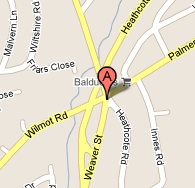 Development at the Five Corners in Scarsdale continues to be a hot topic at Scarsdale Village Hall. On June 7, the Land Use Committee held a second open meeting in Rutherford Hall to review questions about the proposed condominium project to be built at 2-4 Weaver Street on land adjacent to the Heathcote Tavern.
Development at the Five Corners in Scarsdale continues to be a hot topic at Scarsdale Village Hall. On June 7, the Land Use Committee held a second open meeting in Rutherford Hall to review questions about the proposed condominium project to be built at 2-4 Weaver Street on land adjacent to the Heathcote Tavern.
Developers Frederick Fish and Stephen Oder have offered to buy a small strip of Village land that borders the parking lot to include in the project. The additional strip of land would allow them to set the project further back from the road, increase the distance between the new building and the Heathcote Tavern and move the curb cuts for the project further away from the intersection.
However there is still community concern about congestion in the area, the additional traffic that could be created by the project and pedestrian safety. Members of the Heathcote Five Corners Coalition attended the hearing and posed many questions about the size and height of the project, setbacks, variances and building and zoning requirements.
Stephen Oder did not attend this meeting, but asked Project architect Joe Plouffe to respond to the long list of questions that compared the buildable area, the building footprint and the project size in the case that the Village retained the land or opted to sell it to the developer. The Coalition also posed questions about lighting and ventilation in the Tavern building in the event that the new building was constructed and questioned the required setbacks from Wilmot Road and the Heathcote Bypass.
The architect responded that no variances would be needed for setbacks, however the developer would require a variance for the number of required parking spaces – which is currently three per unit. In response to questions about the number of units to be built with and without the village owned land, the architect said that 10 units could be built in the new building without the village strip and 12 units if it was included in the project. However, additional units can be added in the space in the current tavern building.
From the conversation, it appeared that the Trustees would have little reason to deny the developer the land. Land Use Committee Chair Jonathan Mark ended the session saying that the Trustees would go into executive session to discuss the potential land sale.
However it appears that the Heathcote Five Corners Coalition plans to continue to address area development. Last week they mailed out a fundraising letter to their members asking for $100 per household to pursue their work. Citing traffic congestion, pedestrian safety and new construction the Coaltion appealed to residents for funds. They said, “Volunteer members of the Coalition attend meetings of the Village Board of Trustees, the Planning Board, the BAR, and other meetings with local civic organizations. We seek the advice of urban planners, architects and legal counsel …to protect the interests of residents.”
Many of the decisions affecting the area have already been made. The new 11,000 square foot retail building at 1 Palmer Avenue has already been approved. The nine homes at Heathcote Manor further down Weaver Street are under construction and it looks as if the land sale and development at 2-4 Weaver Street will go forward. That leaves the discussion about a potential traffic roundabout at the Five Corners that was proposed to ease congestion. Any objections to that?
Brooke Shields Visits Chat
- Details
- Hits: 5735
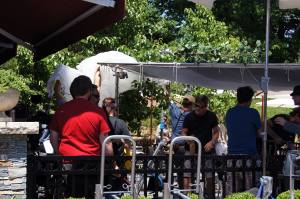 Cameras, wires and a film crew spilled out to the sidewalk in front of Chat American Grill on Christie Place on Friday, June 2nd. Residents attempted to peer beyond the potted palms on the patio to find out what was in the works…. was it a movie or an episode of a TV series? It was neither according to Chat’s Mario Fava and Police Officer Boggi who were on the scene managing the curious onlookers.
Cameras, wires and a film crew spilled out to the sidewalk in front of Chat American Grill on Christie Place on Friday, June 2nd. Residents attempted to peer beyond the potted palms on the patio to find out what was in the works…. was it a movie or an episode of a TV series? It was neither according to Chat’s Mario Fava and Police Officer Boggi who were on the scene managing the curious onlookers.
Turns out the crews were filming a new commercial for La-Z-Boy furniture starring spokeswoman Brooke Shields. In the latest spot she was filmed extolling the benefits of La-Z-Boy seating while sitting on the patio at Chat. Due to legal restrictions we were not permitted to shoot Brooke Shields as she was shot by the cameras, but she emerged from her black SUV looking cheerful and svelte – and could have been mistaken for many of the

You can view an earlier La-Z-Boy spot starring Brooke here :
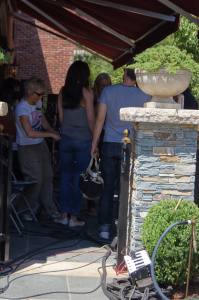

A Memorable Memorial Day Parade
- Details
- Hits: 4196
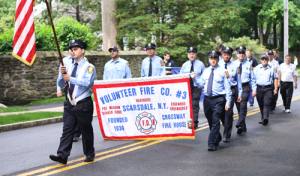 All segments of the community turned out to participate in the Memorial Day Parade in Scarsdale on Monday May 30th. Among the participants were the Police, firefighters, Legion of Honor, Boy Scouts, Girl Scouts, the Mayor, Trustees and even the Marines! Scarsdale sophomore Lindsay LeBoyer sent it these beautiful photos to commemorate the day:
All segments of the community turned out to participate in the Memorial Day Parade in Scarsdale on Monday May 30th. Among the participants were the Police, firefighters, Legion of Honor, Boy Scouts, Girl Scouts, the Mayor, Trustees and even the Marines! Scarsdale sophomore Lindsay LeBoyer sent it these beautiful photos to commemorate the day:





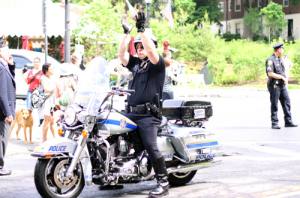
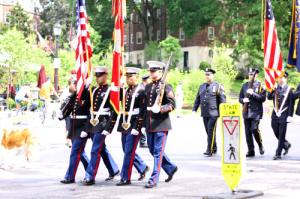



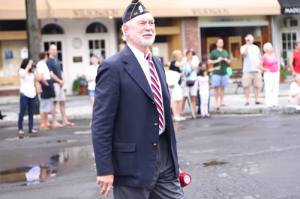

What's This?
- Details
- Hits: 4781
 Local residents were surprised to see a huge new communications tower looming over the new police headquarters under construction at the corner of Fenimore and Post Roads.
Local residents were surprised to see a huge new communications tower looming over the new police headquarters under construction at the corner of Fenimore and Post Roads.
If the new Safety Headquarters wasn’t imposing enough, the addition of a four to five story tower, capped with an American flag makes the new construction seem even more massive. The new building is taller than the former headquarters and extends closer to both Fenimore and Post Roads, giving an impression of increased bulk.
Members of the Greenacres Association were given a chance to review the building plans a few years back, but no one in the group remembers a communications tower in the renderings. From what we could learn, the tower was originally supposed to be on Fenimore Road rather than Post Road but may have been moved to improve the signal for radio transmission for both the police and fire 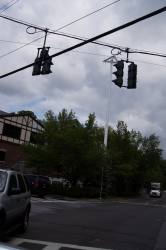 departments.
departments.
So now Greenacres homeowners have two towers in their midst – the blue light from the Ritz Carlton in White Plains and the communications tower at Safety Headquarters. An inquiry to Village Hall about the tower received no response.
Update: June 1:
Paul Zaicek, Director of Captial Projects for the Village of Scarsdale sent in the following response:
"The new Public Safety Building radio tower replaces the old tower that was removed at the beginning of the project to make room for the expansion of the south side of the building. The old radio tower was 100 ft tall and the new tower is 110 ft. tall. The new tower is taller because the site drops approximately 10 ft. from the old location to the new location therefore to maintain the same top of tower elevation the new tower had to be 10 ft. taller. The elevation that the new radio antennas are to be mounted gives the Village Fire and Police radio systems the best coverage and are at the same elevation they were mounted previously."
"The new radio tower was always part of the project and was included in all the renderings. At the beginning of the planning phase the plans and renderings showed the new tower along the west side of the site (same side the old tower was located). The Village received feedback from residents at multiple municipal meetings that the proposed tower location was too obtrusive to the adjacent neighborhood and needed to be moved. After hearing the residents comments the Village and Village Architect took another look at it and decided to move the tower to the east side of the site so it would have less of a visual impact to the adjacent neighborhood. The renderings were modified to show the new tower location prior to receiving authorization from the Village Board of Trustees to advertise for the receipt of construction bids. The tower is a permanent structure."
Another notable sight: A spray painted sign that reads “New Beginnings 2011” was found leaning on a tree in front of the house at the Duck Pond. The home is soon to be demolished to make way for a new house on the property. The meaning of the sign is unknown. Is New Beginnings the name of the construction company that will handle the job or is this simply a philosophical statement of what’s to come at 1 Duck Pond Road?
